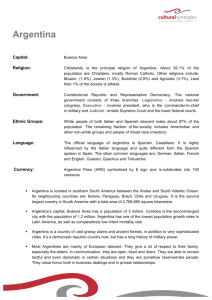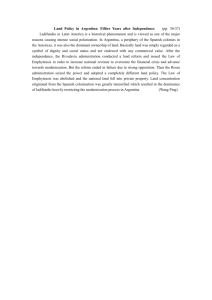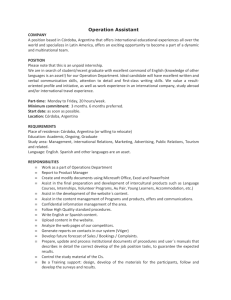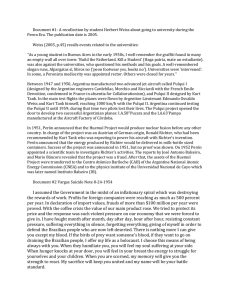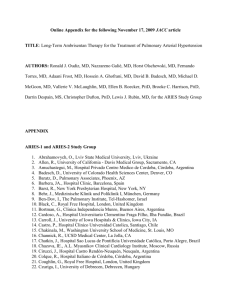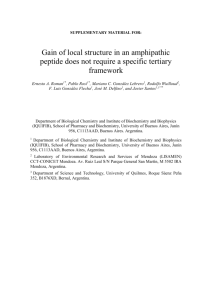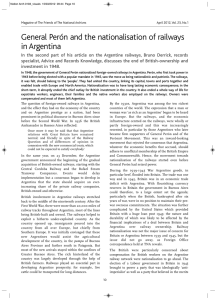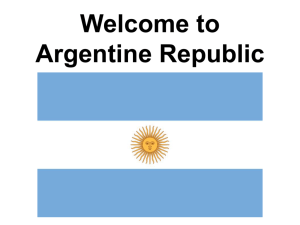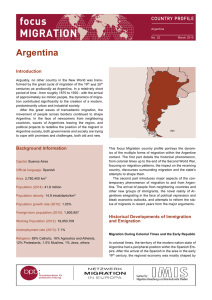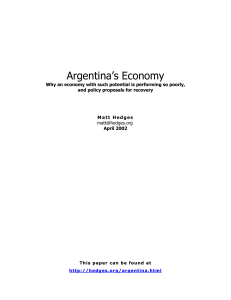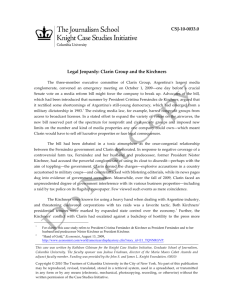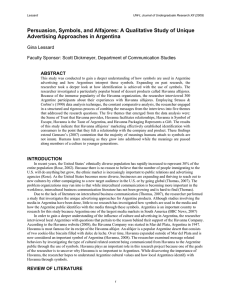Argentina – people, culture, language
advertisement
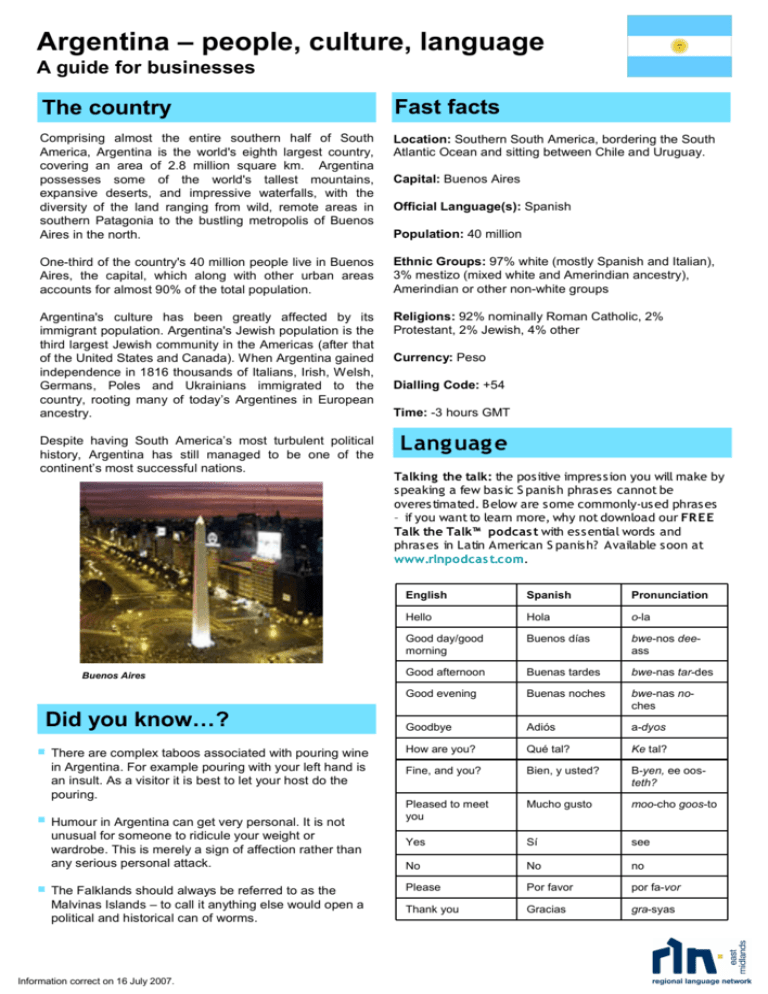
Argentina – people, culture, language A guide for businesses The country Fast facts Comprising almost the entire southern half of South America, Argentina is the world's eighth largest country, covering an area of 2.8 million square km. Argentina possesses some of the world's tallest mountains, expansive deserts, and impressive waterfalls, with the diversity of the land ranging from wild, remote areas in southern Patagonia to the bustling metropolis of Buenos Aires in the north. Location: Southern South America, bordering the South Atlantic Ocean and sitting between Chile and Uruguay. One-third of the country's 40 million people live in Buenos Aires, the capital, which along with other urban areas accounts for almost 90% of the total population. Ethnic Groups: 97% white (mostly Spanish and Italian), 3% mestizo (mixed white and Amerindian ancestry), Amerindian or other non-white groups Argentina's culture has been greatly affected by its immigrant population. Argentina's Jewish population is the third largest Jewish community in the Americas (after that of the United States and Canada). When Argentina gained independence in 1816 thousands of Italians, Irish, Welsh, Germans, Poles and Ukrainians immigrated to the country, rooting many of today’s Argentines in European ancestry. Religions: 92% nominally Roman Catholic, 2% Protestant, 2% Jewish, 4% other Despite having South America’s most turbulent political history, Argentina has still managed to be one of the continent’s most successful nations. Buenos Aires Did you know…? There are complex taboos associated with pouring wine in Argentina. For example pouring with your left hand is an insult. As a visitor it is best to let your host do the pouring. Humour in Argentina can get very personal. It is not unusual for someone to ridicule your weight or wardrobe. This is merely a sign of affection rather than any serious personal attack. The Falklands should always be referred to as the Malvinas Islands – to call it anything else would open a political and historical can of worms. Information correct on 16 July 2007. Capital: Buenos Aires Official Language(s): Spanish Population: 40 million Currency: Peso Dialling Code: +54 Time: -3 hours GMT Lang uag e Talking the talk: the positive impres sion you will make by s peaking a few basic S panish phras es cannot be overestimated. B elow are s ome commonly-us ed phras es – if you want to learn more, why not download our FR EE Talk the Talk™ podcas t with ess ential words and phras es in Latin American S panish? Available soon at www.rlnpodcas t.com. English Spanish Pronunciation Hello Hola o-la Good day/good morning Buenos días bwe-nos deeass Good afternoon Buenas tardes bwe-nas tar-des Good evening Buenas noches bwe-nas noches Goodbye Adiós a-dyos How are you? Qué tal? Ke tal? Fine, and you? Bien, y usted? B-yen, ee oosteth? Pleased to meet you Mucho gusto moo-cho goos-to Yes Sí see No No no Please Por favor por fa-vor Thank you Gracias gra-syas M eeting and g reeting B us ines s meeting s When meeting a handshake is the norm. As the relationship warms up this may lead to more physical contact such as a pat on the shoulder or a hug. Appointments are necessary and should be made at least two weeks in advance, preferably by email or telephone. Women will often exchange kisses on the cheek. January and February should be avoided as this is when holidays are taken. The middle weeks of July are also when many go skiing. Titles, especially among the older generation, are very important. Address a person directly by using his or her title only: a PhD or a physician is called Doctor, a teacher Profesor, an engineer Ingeniero, an architect Arquitecto and a lawyer Abogado. Persons who do not have professional titles should be addressed as Mr., Mrs., or Miss, plus their surnames. In Spanish these are: Mr. = Señor Mrs. = Señora Miss = Señorita In some older, more bureaucratic organisations, you may find the more important the person you are meeting, the longer you will be kept waiting. Due to their hierarchical nature Argentines would expect to be met by someone sharing the same rank. Do not immediately begin discussing business. Remember to invest in the relationship; so engage in plenty of small talk and show an interest in the person you are meeting. It is quite normal for people to accept telephone calls and attend to other business during a meeting. Have all printed material available in both English and Spanish. Decisions are not reached at meetings. Meetings are for discussion and to exchange ideas. B us ines s is pers onal A rgentina’s capital, B uenos A ires, is where Tango was born. C ommunication Most Argentines believe being frank, open and direct is good but, in reality, are very indirect and diplomatic. Not to offend is important and so you might occasionally find this indirectness, which aims at appearing amiable and tactful, confusing. Avoid confrontation. Argentines dislike disagreements. Where there are tricky issues to address, do so in a manner that places nobody in direct blame. Hierarchy is respected so it is imperative to show deference and esteem to those in positions of authority. When dealing with people at the same level, communication can be more informal. Argentina is a relationship-driven culture, so it is important to build networks and use them. Above all Argentines like to do business with people they know and trust. It is necessary to obtain third party introductions in Argentina. This can be achieved through contacts you may already have or institutions such as embassies, law firms, consultancies or banks. Building a good personal relationship is crucial and fundamentally comes down to building rapport and spending time getting to know your local contacts. Good topics of conversation are family, football, music and world events. Avoid religion, the Falklands War and Argentine politics. Once a relationship has developed, their loyalty will be to you rather than to the company you represent. At this stage you also have access to a network of family and friends to call upon for help, favours or assistance. If a favour is done for you, you will likely be called upon to repay it in the future. Further res ources UK Trade & Investment: S upport for those wanting to do business in/with Argentina. www.uktradeinvest.gov.uk B ritish Argentine C hamber of C ommerce: provides its members with source of contacts and up to date information about doing business in Argentina. www.britargcham.co.uk Argentine E mbassy UK: cons ular and travel information. www.argentine-embassy-uk.org Latin Trade Online: online version of Latin America’s largest and mos t respected pan-regional business magazine. www.latintrade.com Foreign & C ommonwealth Office: Up to date travel advice for Argentina. http://www.fco.gov.uk R LN E as t Midlands : promoting a greater national capability in language and cultural skills for bus iness and employment. P lease note: W hile every effort is made to ensure accuracy, the R egional Language Network does not take responsibility for the content of this briefing. O pinions expressed are not necessarily those of the R egional Language Network or of C ILT, the National C entre for Languages. Information correct on 16 July 2007. Tel: 01332 826432 Fax: 01332 826393 www.rln-eastmidlands.com

